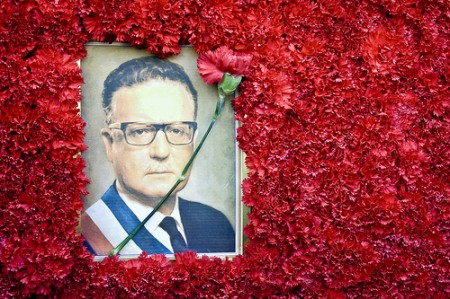
When it comes to natural disasters, Chile has a troubled past. As the plume of ash from volcanoes at Puehue and Cordón Caulle continues to blanket the skies and force people from their homes, rebuilding efforts following last year’s earthquake have only just begun. Fifty years ago Chile was also the site of the most powerful earthquake ever recorded – the gran terremoto, at Valdivia – and initial indications following this latest event suggest that the geological situation may get worse in the future.
But if its history of geological instability were not enough, Chile is also struggling with its political past. On 23 May, in compliance with a court order, the body of former President Salvador Allende was exhumed in order to begin a formal investigation into the disputed circumstances of his violent 1973 demise.
There are many versions of the events. The official story – and the one accepted by Allende’s family – is that the President shot himself (with an AK-47 given to him by none other than Fidel Castro) shortly before rebel forces stormed his office. Another version has it, instead, that he was gunned down in a defiant last stand; yet another, that he was executed by a subordinate after a botched suicide attempt. But the man ultimately responsible (if probably not personally) for Allende’s death is General Augusto Pinochet himself, whose successful coup d’etat then saw him installed first as the head of the governing junta and then as president.
More than anything else, these events are the great earthquake in Chile’s modern political history – and like the one last February, Chile has not fully come to terms with it. On the one hand, the 17 years of Pinochet’s rule saw him accused of widespread crimes against humanity. In 1998, in a watershed moment in international law, he was dramatically arrested and detained in London on these charges before being released on grounds of ill-health.
Among the thousands of murders and ‘disappearances’ of which Pinochet has been accused or is suspected, one of the most emotive to Chileans must be the case of the celebrated Noble Laureate, Pablo Neruda –into which a Chilean judge opened a parallel investigation last week. Also being investigated is the death of Allende’s predecessor, Eduardo Frei Montalva, supposedly from complications following a routine surgery in 1982, after a Wikileaks cable revealed details of a hasty and highly irregular autopsy .
Paradoxically, of course, many observers believe 1973 laid the foundation for the milagro de Chile – the period of impressive growth (by regional standards) in the early 80s, following the hyperinflation of the 70s. The debate over whether Chile’s recovery was the result of neo-liberal reforms – the so-called ‘Monetarist experiment’ – implemented by the ‘Chicago Boys,’ as Milton Friedman concluded, or happened despite them, as Amartya Sen has argued, is likely to persist, perhaps in contrast with its waning significance for the Chilean people.
But there is more at stake in these investigations than the historical record, the international human rights agenda or ideological genuflections to the Cold War. Whatever the forensic outcome, these investigations themselves could never be the final word on the Chilean dictatorship, never settle the many controversies surrounding it or bring justice and reconciliation to those still affected and traumatized by it.
At the inauguration of current President Sebastián Piñera, who leads Chile’s first conservative government since the fall of Pinochet, powerful aftershocks from last February’s earthquake caused the ceremony to be evacuated. In any case, there is still a lot of work to do.

